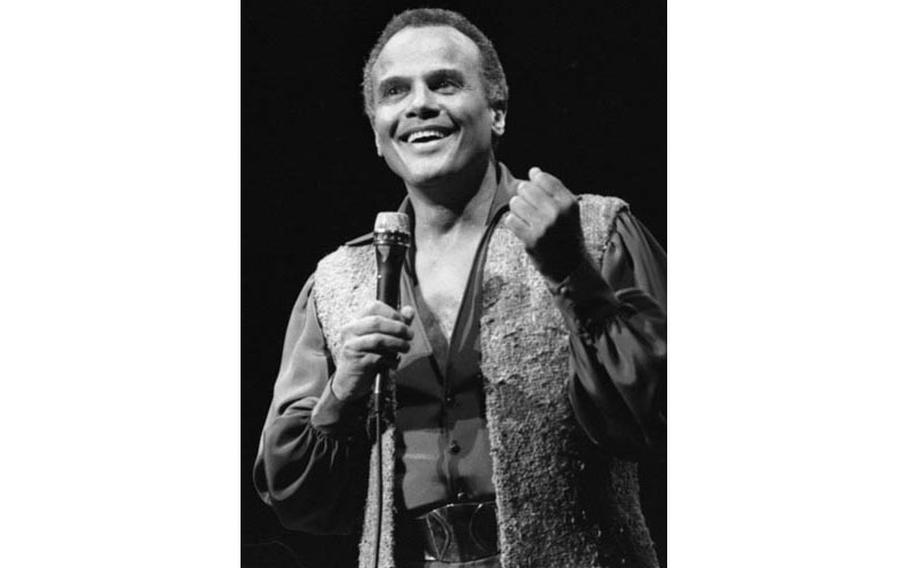
Harry Belafonte performs in Frankfurt, Germany, on Oct. 17, 1983. (Marty Davis/Stars and Stripes)
I’ve waited nearly 20 years to see Harry Belafonte perform. Unabashedly, I say, it was worth it.
Understand, I grew up in Miami, not that far from the West Indies where Belafonte grew up. As a small boy there, Belafonte had serious eye problems, so he was taken to the eye clinic at the University of Miami for surgery.
Later, to show his appreciation, Belafonte gave benefit recitals for the university. There were galas amid tremendous publicity surrounding the specials. I couldn’t afford to go, but the hype created a yearning that went unfulfilled.
During that wait, I’ve listened to Belafonte albums through my headphones, my eyes dosed, my head resting on my recliner, dozing contentedly to calypso and mesmerizing ballads like “Scarlet Ribbons.”
I conjured up images of the man, the performer whose soothing sounds relaxed me so.
Last Sunday, at the Jahrhunderthalle in Hoechst west of Frankfurt, my wait ended. It was some enchanted evening.
THE CONCERT BEGAN ON time, unlike scores of others I’ve attended. In one burst of light, Belafonte appeared, his four backup singers behind to his right, his six-man band directly behind him.
The show was on, without benefit of a lot of artificial sounds and gimmicks so popular with today’s artists. Absurd hairstyles, makeup, punk, jumping around does not a performer make.
There was just Belafonte, creating a bond between him and the audience.
He got flowers, dozens of them, and thanked each giver personally with a handshake and a kiss.
“It’s a wonderful thing to give flowers,” he said. “I thank you for your generosity.”
It was corny. But Belafonte’s sincerity made it work.
Belafonte seems to enjoy his work. He seems sincere. He seems effortless, which is a tribute to the talents he’s developed to mask the diligence he puts into each show.
At 56, it would be easy for him to slow down.
Especially on this tour, which began last May and continues until mid December. But the concert was longer than three hours, 13 songs in all by Belafonte, a fine mixing of calypso, protest songs and ballads choreographed to create a roller coaster of emotions.
“Try to Remember,” with the haunting backup singing of Arthur Williams, is a Belafonte classic. His version makes you feel the ache, the romance, the cold winter days in December when you long for the September past.
Belafonte sang of the death of Martin Luther King Jr., the frustration his passing created, and of the black leader’s work for peace in which “open arms the only weapon we bore.”
Belafonte told of being approached recently by a German woman wanting to know why she can’t find his latest albums.
“I haven’t made any,” was his response, and then he sang his explanation in his sardonic rendition of “Sing For the Song, Boys,” a biting jab at swell-headed singers who pervert their talent for big bucks, cocaine, and the ubiquitous groupie.
Throughout the evening Belafonte jokes, Belafonte dances, Belafonte offers vignettes on his music. He shares himself, ordering ushers not to shoo people away who come front stage to take pictures. He tells others asking for autographs to come backstage after the performance.
Belafonte made us feel alive, part of the performance, and wonderful. He sang for “Peace on Earth,” and of “Matilda,” the woman who takes his money and runs to Venezuela. He tells of toiling banana plantation workers in “Day-O,” and the glory of his heritage in “Island in the Sun.”
I WOULD BE REMISS IF I didn’t mention Belafonte protege Dianne Reeves, who sang her heart out in six solos and two duets. I didn’t recognize her songs, some consisting of sound groupings imitating instruments in a style perfected by Cleo Laine.
Reeves is talented, skilled, and seemingly as concerned as Belafonte about her craft. She brings a dignity to the stage I assume she got from Belafonte. Given the right song and the right studio, she can be a commercial success.
It would also be unfair not to mention Belafonte’s skilled backup band and singers, who enhance without overpowering. The band: Dan Carillo (guitar), Neil Clarke (percussionist), Bob Weiner (drummer), Angus Nunes (bass), Marc Canpor (keyboards) and Richard Cummings (keyboards/music director). The vocalists: Gwen Moten, Deborah Sharpe, Beauris Whitehead and Arthur Williams.
At the end, Belafonte thanked us for coming, and left. The demanding German audience wanted more, clapping, stomping, whistling.
Belafonte returned in street clothes, seemingly embarrassed by the fuss made over the Harlem-born performer who has perfected his craft and refuses to change to satisfy the whims of today.
He said farewell to us with “Jamaica Farewell,” and then he was gone.
It was a classy show by a classy guy., who earlier said, “We take a great deal of pride in who and what we are.”
It shows, Harry, it shows.